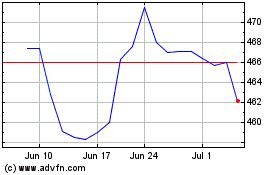U.S. Air Force Missile-Tracking Satellite Launch Scrubbed From Florida
January 19 2017 - 10:16PM
Dow Jones News
By Andy Pasztor
An aircraft flying near the launch area forced the cancellation
of Thursday's planned liftoff of a $1.2-billion Air Force
missile-tracking satellite from Cape Canaveral Air Force Base in
Florida.
Following a propulsion issue that temporarily halted countdown
for the 19-story Atlas V rocket, the launch was scrubbed for the
day around 8:30 p.m. local time due to the errant aircraft. Launch
of the roughly five-ton spacecraft was rescheduled for Friday
evening.
The launch would have been the first of 11 blastoffs slated for
the year by United Launch Alliance, a joint venture between Boeing
Co. and Lockheed Martin Corp.
Lockheed Martin also built the satellite, called by the acronym
SBIRS, part of a wide-ranging constellation of satellites intended
to detect and track ballistic missiles using infrared sensors from
various orbits. Two of the same type of satellites already are in
orbit roughly 22,000 miles high, and the fourth such satellite is
anticipated to be launched later in 2017.
SBIRS over the years suffered some of the biggest technical
problems, schedule delays and budget overruns affecting any
Pentagon satellite program. But since the first batch of SBIRS
satellites was launched and started sending information to the
ground nearly a decade ago, military officials and senior Lockheed
Martin officials have said the quality of the data exceeded their
expectations.
Write to Andy Pasztor at andy.pasztor@wsj.com
(END) Dow Jones Newswires
January 19, 2017 22:01 ET (03:01 GMT)
Copyright (c) 2017 Dow Jones & Company, Inc.
Lockheed Martin (NYSE:LMT)
Historical Stock Chart
From Mar 2024 to Apr 2024

Lockheed Martin (NYSE:LMT)
Historical Stock Chart
From Apr 2023 to Apr 2024
